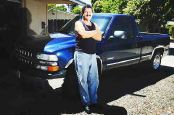Working from his one-bedroom Merced home, the 53-year-old Santos researches renewable fuels on the Internet, runs experiments with energy sources he has around his house and dreams of inventing something that will change people's lives.
"We're destroying our earth and environment," Santos said.
In his front yard, a solar panel he bought 25 years ago for $425 keeps a knee-high refrigerator at 70 degrees. Inside his garage, a refrigeration system, labeled and attached to a board, blows cool air.
If he had the money, he said he would build a fuel cell that would power his home.
Santos, who is currently unemployed, worked as a mechanic before becoming interested in refrigeration.
With gas prices rising, Santos decided to use his two years of research about hydrogen fuel to improve his mileage, if only slightly.
A few weeks ago, Santos rigged his 2000 Chevrolet Silverado 1500 pickup to separate purified water mixed with sodium hydroxide into hydrogen and oxygen using electricity.
The hydrogen, injected into the air going to the engine, adds about four extra miles for every gallon of gas while he's driving down the highway, he said.
On a full tank, Santos said he gets about an extra 100 miles.
Beneath the hood, the truck has a reservoir that holds just less than a gallon of the water and sodium dioxide mixture. An electric current runs through the container, allowing the hydrogen atoms to break from the oxygen atoms.
After three weeks of driving, Santos still hasn't needed to refill the reservoir.
"I never thought water could be a fuel because you can't burn it," he said. "But when you separate the oxygen, you can."
The engine add-on, which Santos calls an electrolyzer, cost about $40, with the stainless steel fittings being the most expensive component.
Santos filled a test tube with hydrogen from his engine and ignited it with a cigarette lighter. The tube combusted with a yellow flash and a quiet pop.
"Hydrogen is going to be our next fuel source," Santos said, adding that technology and knowledge for hydrogen as fuel has been around for more than 100 years.
Santos thinks his other invention -- a solar-powered belt buckle lighter -- will catch on and be profitable. He has a patent pending and plans to audition it for ABC's television show "American Inventor."
"I see this as a surviving tool," he said. "If you're in the mountains with no matches or lighter, you'll always have this."
The belt buckle's chromed inside reflects enough sunlight to ignite a cigarette or fire. It can also be used to flash help signals at rescue planes.
Friends are intrigued by his truck's electrolyzer, but no one has asked him to install one, he said.
But that doesn't dim Santos' hope.
"I just want to help the environment in Merced -- saving our planet, one car at a time."
